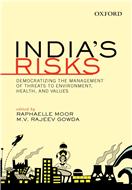You can now watch video of the launch event of the book ‘India’s Risks: Democratizing the Management of Threats to Environment, Health and Values’.
The video features contributions from Professor M V Rajeev Gowda, Honorable Member of Parliament and Prof Ian Scoones, STEPS Centre Director. The launch event was held at the British Council in Delhi on 19 February 2015.
Watch the video coverage below (if you can’t see the embedded video, you can view it directly on YouTube):
More about the event
Prof M V Rajeev Gowda introduced the ‘India’s Risks’ book which he co-edited with Raphaelle Moor, in conversation with a range of eminent panellists:
- Professor Shiv Visvanathan, Professor and Vice Dean, Centre for the Study of Science, Society and Sustainability, Jindal School of Government and Public Policy, O.P. Jindal University
- Mr Keshav Desiraju, Secretary, GOI Ministry of Consumer Affairs, Food and Public Distribution
- Dr Nafees Meah, Director – Research Councils UK, India
The event is organised in association with the British Council.
About the book
 A prospective superpower, India is still grappling with a host of risks that threaten to hamper its progress. These range from environmental threats caused by GM crops and pollution; dangers to health from HIV/AIDS and maternal mortality; safety concerns about natural hazards, nuclear power, and industrial disasters; and challenges to livelihoods and values.
A prospective superpower, India is still grappling with a host of risks that threaten to hamper its progress. These range from environmental threats caused by GM crops and pollution; dangers to health from HIV/AIDS and maternal mortality; safety concerns about natural hazards, nuclear power, and industrial disasters; and challenges to livelihoods and values.
Some of the issues that this volume explores are: what counts as an ‘acceptable’ risk, and who decides? How should divergent perceptions of risks be reconciled? And, where is the line between science and politics? Advocating a more multidimensional approach to managing risks, the authors challenge many of the dominant perspectives in India.
The field of risk research, which has emerged over the last 40 years in the West, has been relatively unexplored in India. In an effort to bridge this gap, this volume brings together Indian and Western scholars and practitioners across the fields of psychology, anthropology, law, politics, sociology, public health, philosophy, science, and architecture, who offer insights on the theory of risk, lessons from the West, and the realities of risk in India.